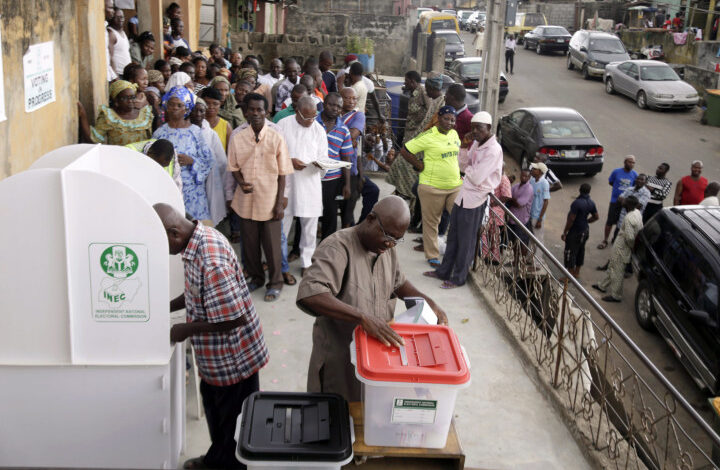Misinformation May Aggravate Tension As General Elections Approach In Nigeria
Experts say the spread of misleading information, especially on social media, has become an increasing problem to the integrity of elections and the trust people have in democratic institutions.

There was outrage on Nigerian social media on Thursday, June 23, after a video went viral. The person who recorded it had alleged that a group of Muslims tried to prevent others from registering for the Permanent Voter’s Card (PVC) in Abuja, the country’s capital, because they were Christians.
“The ones with the moustache and the rest of them, they are making calls to cause crisis in Lugbe, Federal Housing, and the people are upset. But for our safety we had to leave,” the voice behind the lens said while recording from a moving vehicle.
She alleged that the disruptors did not want Peter Obi’s supporters, the Labour Party presidential candidate, to complete the voter registration process.
One of the tweets containing the video was shared over 2,500 times, with the video being watched over 40,400 times.
Reactions to the tweet showed that it reinforced religious and ethnic stereotypes, with many believing that Christians in the area were being disenfranchised and persecuted.
“This is part of the reasons I’m not moved by people just rushing out to go register for PVCs cause there are myriads of ways by which they want to disenfranchise the people ranging from INECs inefficiencies to stoking violence that will scare people from going to vote,” one reply went.
“The best thing is to divide this country, let this muslims [sic] go and establish their Islamic heritage in the northern Nigeria. A whole Abuja, capital of Nigeria, & nobody is talking. This is a national project, PVC. Why why why,” another Twitter user commented.
However, a report by TheCable later established that the bearded man was only asking people in the queue to be orderly and pleading that pregnant women and elderly ones be allowed to register before others. The FCT Police Command and an official of the Independent National Electoral Commission (INEC) also described the narration in the video as false.
But this does not undo the damage already done by the video, which remains on the internet. Replies to the online paper’s fact-check also showed that many who read it still believed there was an attempt to disrupt the registration process in the locality.
In a recent report, FactCheckHub highlighted how the conduct of the June governorship election in Ekiti State, Southwest Nigeria, was rocked by the spread of fake news, a development likely to disrepute the major flagbearers.
The use of social media to sow distrust and weaponise misinformation during elections is not a new phenomenon. For example, CNN noted in 2019 how its “report about weapons being smuggled into Nigeria during the elections, filmed in the lead-up to the 2011 elections” was reshared on WhatsApp as though it was a current story.
Several inaccurate reports and misleading pictures were also used to frustrate the 2019 general elections. One example was a false report that Peter Obi, then vice-presidential candidate of the opposition party, the People’s Democratic Party (PDP), asked northerners to carry ID cards while he was Anambra state governor.
After the last general elections got postponed too, a local blog uploaded President Muhammadu Buhari’s picture with the caption: “Breaking News: Buhari Just Arrived His Unit for Accreditation, Saying He Is Not Aware That The Election Has Been Postponed.” However, a Google reverse image search of the picture showed that it was taken in 2015 during the previous presidential election.
Nigeria’s next general elections are less than a year away, and the spread of politically-motivated misinformation is expected to rise. Apart from its potential to cause violence, this could mislead the electorate to make ill-informed political decisions and weaken electoral integrity. The International Foundation for Electoral Systems (IFES) observed in a 2019 study that “mis/disinformation, particularly through social media, has become an increasing problem to electoral integrity and citizens’ trust in their democratic institutions.”
Nigeria’s domestic intelligence agency, the Department of State Services (DSS), has warned that fake news is one of the biggest threats to the 2023 general elections. “Social media and fake news are the biggest threats to human existence, not only to elections. Fake news is a major cause of violence in our society,” DSS spokesperson Peter Afunanya told journalists in June as he urged them always to verify information before publishing.
On his part, Niyi Oyedeji, a fact-checker with the International Centre for Investigative Reporter (ICIR), said it is important to take deliberate steps to guard against fake news as the 2023 elections approach.
“We all must remember that retracting fake news does not translate to stopping the implications of the wrong information,” he told HumAngle.
“Not everybody that reads the fake news gets to read fact-checks done by fact-checkers, so violence may occur. If you think this is extreme, ask the Rwandans about the genocide that killed hundreds of thousands of people. It was caused by fake news on the radio.”
This report was produced in partnership with HumAngle Services.
Support Our Journalism
There are millions of ordinary people affected by conflict in Africa whose stories are missing in the mainstream media. HumAngle is determined to tell those challenging and under-reported stories, hoping that the people impacted by these conflicts will find the safety and security they deserve.
To ensure that we continue to provide public service coverage, we have a small favour to ask you. We want you to be part of our journalistic endeavour by contributing a token to us.
Your donation will further promote a robust, free, and independent media.
Donate HereStay Closer To The Stories That Matter




